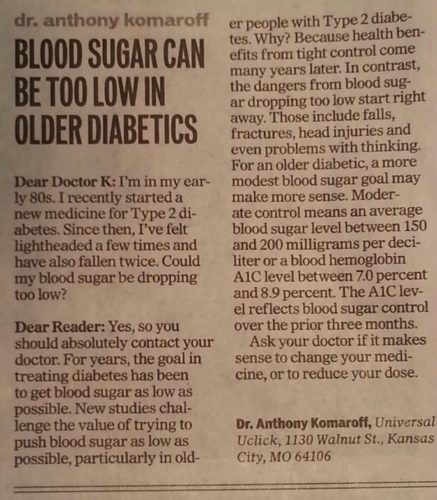 Nice response from Dr. Komaroff in answering a question from one his readers. (Saw this in the Wednesday, August 17, 2016 edition of The Virginian-Pilot). Older people with diabetes definitely need to speak to their physicians about what target blood sugar levels should be. While having chronically high blood sugars is bad over the long term, hypoglycemia, low blood sugar, can cause immediate problems! You must treat low blood sugars with a sense of urgency. Blood sugar monitoring is important. As we age, our ability to feel low blood sugars can diminish. Often, the older patient with diabetes may be taking multiple medications for a variety of health issues. This too can inhibit the body’s response to recognizing low blood sugar levels. Because of these issues, the recommendation is to allow blood sugar levels to run a little higher for this group. Dr. Komaroff details that very well in his column.
Nice response from Dr. Komaroff in answering a question from one his readers. (Saw this in the Wednesday, August 17, 2016 edition of The Virginian-Pilot). Older people with diabetes definitely need to speak to their physicians about what target blood sugar levels should be. While having chronically high blood sugars is bad over the long term, hypoglycemia, low blood sugar, can cause immediate problems! You must treat low blood sugars with a sense of urgency. Blood sugar monitoring is important. As we age, our ability to feel low blood sugars can diminish. Often, the older patient with diabetes may be taking multiple medications for a variety of health issues. This too can inhibit the body’s response to recognizing low blood sugar levels. Because of these issues, the recommendation is to allow blood sugar levels to run a little higher for this group. Dr. Komaroff details that very well in his column.
But, I would take it a bit further. To be sure of blood glucose levels, you must check! Use a blood glucose monitor to track how your body responds to your diabetes medicine, dietary changes and activity levels. For people with Medicare coverage blood glucose monitoring is approved for one glucose check a day, unless you are on insulin. With insulin use, you are typically granted 3 times a day approval. Regardless of the coverage, if you are on hypoglycemic medications, it is extremely important to regularly check blood glucose levels. Blood glucose monitoring can be an expensive part of your diabetes management program. But, it is a vital part! To make the most of your effort, keep a record of your results and be sure to take those results with you when you see your physician or diabetes educator. Identifying trends in your glucose levels can help to provide better blood glucose management and keep you healthy and safe. Be an active participant of the health care team.
It’s Your Health. It’s Your Life. Make That Change!
~John
Leave a Reply